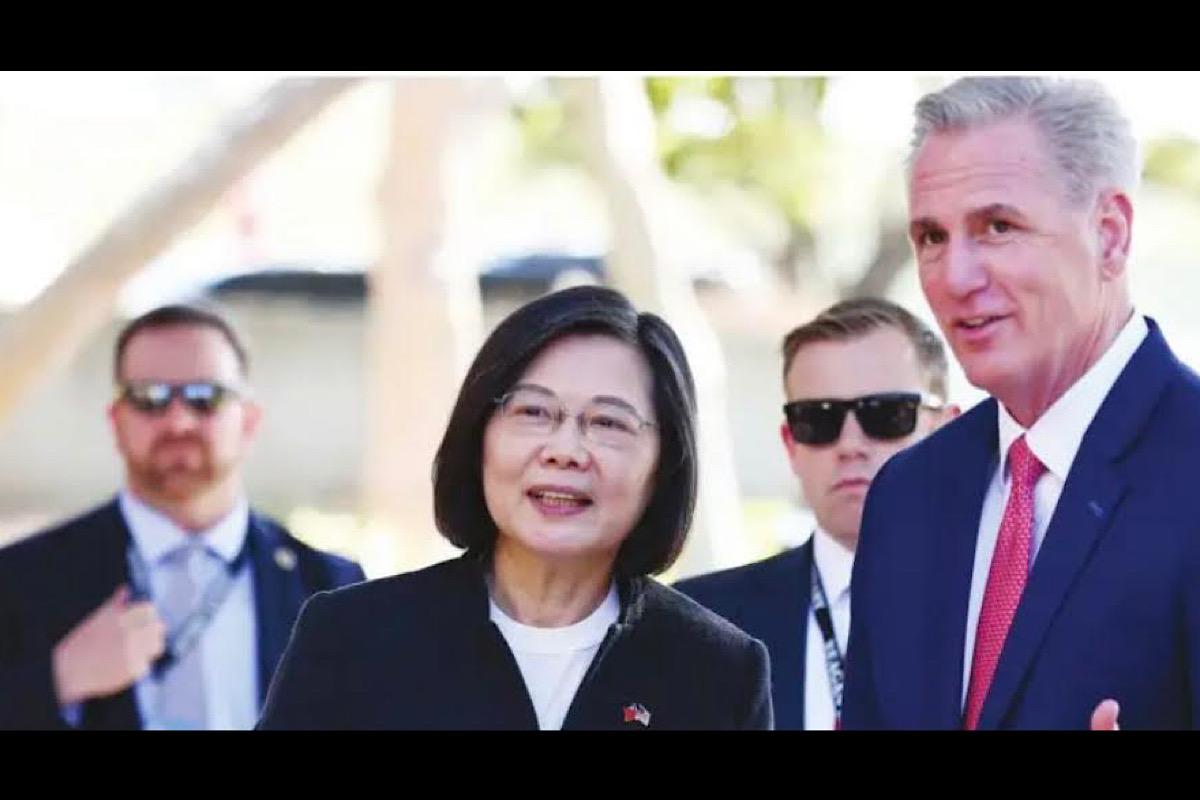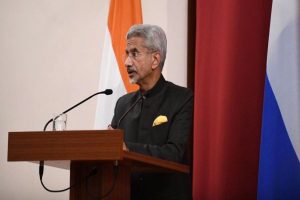Taiwanese president Tsai Ingwen, transiting through the USA, met the Speaker of the US House of Representatives, Kevin McCarthy, in Los Angeles earlier this month, despite strong protests from Beijing. Tsai was visiting Guatemala and Belize and as part of her schedule, she had a stopover in the US.
Well before her visit, China had warned that any bilateral between her and the speaker would be responded to. The McCarthy-Tsai meeting also included other members of Congress. China considers Taiwan as a rogue province and has not ruled out employment of force for reunification. Few nations recognize Taiwan as an independent state.
Advertisement
The US does not recognize Beijing’s claim over Taiwan, but admits that ‘it exists.’ It is currently providing Taiwan with military equipment to boost its military capabilities to counter Chinese aggression. There are also US military personnel on the island, training Taiwanese forces. President Biden has been noncommittal on US support. Since assuming her presidency in 2016, Tsai has made six similar transit visits through the US.
Though her visits have not been accorded official status, she has always met influential members of the US government. Tsai was also awarded with a global leadership award at the Hudson Institute in New York during the current visit. McCarthy’s predecessor, Nancy Pelosi, visited Taiwan in August last year, also against Chinese warnings. It led to China conducting a series of exercises off Taiwan resulting in a few missiles landing in Japanese waters eliciting a strong diplomatic response.
The fact that Pelosi’s visit was just before the Chinese National Congress which was expected to give Xi Jinping an unprecedented third term, added to tensions. McCarthy has also announced his intention to visit the island in the future. McCarthy as the speaker of the house of representatives is third in line to the US presidency, after the vice president, and hence China considers it an affront.
China claims that such interactions are against the one-China principle and ‘harms China’s sovereignty and territorial integrity, and destroys peace and stability in the Taiwan Strait.’ China’s Washington embassy spokesperson warned, “No matter (if) it is the Taiwan leaders coming to the United States or the US leaders visiting Taiwan, it could lead to another serious collision in the China-US relationship (in case the meeting takes place).” McCarthy in response countered, “China can’t tell me where or when to go.”
China’s Global Times in anticipation of the meeting stated, “China has repeatedly stressed that we are firmly opposed to any form of official contact between the US and the Taiwan authorities.” The Chinese spokesperson mentioned in a briefing, “(China) strongly opposes all forms of US contact with Taiwan authorities, which violates the one-China principle.”
The spokesperson threatened, “No one and no force can hold back China’s reunification.” There is no doubt that the US is conveying a message through the McCarthy-Tsai meeting that while it respects the Chinese viewpoint, it is unwilling to bow to Chinese demands. In addition, as it did with the Pelosi visit, it is willing to call the Chinese bluff. The US expects China to huff and puff and display some muscle flexing but nothing more.
The Chinese economy has yet to recover and casualties, in case of any military action, may be more than the Chinese public could bear. China is unlikely to venture into a conflict which it cannot win outright. The US also realizes that China would have learnt lessons from Russia’s invasion of Ukraine and would therefore not attempt any serious military action.
As with the Pelosi visit, the US would blame China for enhancing tensions in the region. It was Chinese exercises, post the Pelosi visit, which acted as a catalyst for Tokyo to enhance its security commitments and also brought states in dispute with China closer to the US. China had to adopt face-saving measures. It could not let the incident pass without a response. Its military exercises post the Pelosi visit angered Western nations resulting in a slew of visits to Taiwan from members of the European community, while China just protested and watched. Beijing, as expected, repeated the exercises, however on a reduced scale.
One reason why China reduced its scale of current exercises was that around the time of Tsai’s US visit, Taiwan’s former president, Ma Ying-jeou, visited Beijing. He was president from 2008-2016 and is the first Taiwanese sitting or ex-president to visit Beijing. His delegation included students and they were accorded a warm welcome by China. Ma’s political party, KMT, is Taiwan’s main opposition party and favours closer ties with China, while denying it is pro-Beijing. Ma had met Xi Jinping while in office. If Beijing had adopted a strong posture against Taiwan, it could enhance anger towards it and reduce chances of KMT returning to power in elections due in January 2024. Alternatively, it could create a sense of fear benefitting the KMT. Beijing chose the safer route. A military offensive is also unlikely, as if it falters it could drag China into an unending conflict as with Russia in Ukraine. Japan is likely to intervene as the loss of Taiwan could threaten its own existence.
Taiwan would also receive support from the US and other western nations. This could damage China in a similar manner as Russia. Within the US there were also issues. While President Biden is a Democrat, McCarthy is Republican. The presidential race has commenced. The China policy would be played up. Any political party displaying a soft corner could be impacted.
Thus, while President Biden hoped the meeting would not take place, he hesitated to advise McCarthy officially. For McCarthy, displaying a strong antiChina stance benefits him and his party’s position. Both China and the US have been dealt different cards by Taiwan. China had to act to save face. If it did not, it would send the wrong message and weaken its claim over Taiwan. Its response also had to be calibrated so as not to cross limits. For the US, it was a political battle with upcoming elections. The only real winner was Tsai.
(The writer is a retired Major-General of the Indian Army.)











